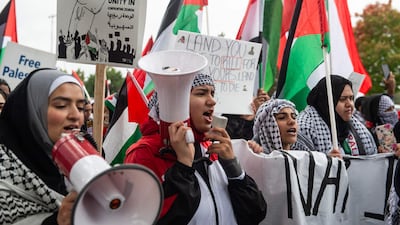Live updates: Follow the latest on Israel-Gaza
For many Muslim Americans in Michigan, Eid Al Fitr will be a solemn affair this year.
At least 10 Islamic centres in and around Dearborn announced they are cancelling all public festivities marking the end of Ramadan, citing the continuing Israel-Gaza war.
Eid breakfasts, festivals and the exchanging of gifts have been called off. Instead, Muslims in much of the so-called capital of Arab America will attend sombre sermons during which donations will be collected for Gaza.
“In light of what has been happening in Gaza for the past six months, how can one celebrate when you know our brothers and sisters in the Holy Land are going through such atrocities, starvation and hunger?” said Imam Mustapha el-Turk.
“It just does not feel right.”
Dearborn Mayor Abdullah Hammoud had planned the city's second Eid community breakfast but it was cancelled on Monday, with organisers citing events in Gaza.
Health officials say more than 33,300 Palestinians have been killed in the Gaza Strip since Israel started its punishing military campaign in response to the October 7 Hamas attacks that killed nearly 1,200 people, according to Israeli tallies.
The UN says famine is looming in Gaza, after months of intermittent and insufficient entry of food and water.
A deadly Israeli attack on a convoy of World Central Kitchen aid workers has further fuelled outrage and concerns that food insecurity will become even more widespread, after at least two charitable organisations halted their operations.
“In lieu of public celebrations, we encourage Islamic centres to redirect their efforts towards raising awareness about the situation in Gaza and mobilising support for humanitarian aid initiatives,” the Imams Council of Michigan said in a statement.
Muslim and Arab Americans, many of whom have relatives in Gaza, have been horrified by President Joe Biden’s support of Israel.
Since the attack on the seven World Central Kitchen workers, Mr Biden, who is running for re-election in November, has toughened his tone with Israeli Prime Minister Benjamin Netanyahu, demanding he do more to protect civilians and aid workers, as well as facilitate the entry of much-needed humanitarian supplies.
But he has stopped short of supporting a permanent ceasefire, or conditioning military aid to Israel – two central demands of Muslim and Arab Americans.
“It's the right thing to do, our community is in pain, we’re in pain,” said Juman Al Omary, a Palestinian American from Michigan. She said she is part of a campaign to encourage people to wear the traditional Palestinian keffiyeh during Eid prayers.
In previous years, her family would attend Eid prayers, then enjoy coffee, sweets and give presents to the children while visiting her family and in-laws.
This year, she and others around her are considering going to work or school as usual.
“We feel we're not being heard as a community,” Ms Al Omary told The National.
Michigan, a critical swing state with a sizeable Muslim and Arab American community, has highlighted the high stakes of the November 5 election for Mr Biden, who is expected to face Republican candidate Donald Trump.
The former president has vowed to reissue legislation banning the entry of many Muslims into the country.
Still, Mr Biden’s policies have drawn intense anger from Muslims and Arab Americans, too, and many have vowed never to vote for him again. In February, more than 100,000 voters cast uncommitted Democratic ballots in Michigan’s primary election. Several states have since organised similar campaigns.
Outside Dearborn, some Muslim Americans said they still plan on celebrating Eid, as it is a duty under Islam.
“It’s Sunna to celebrate,” said Lama Samman Nasry, a Syrian American who lives in Franklin.
“But even if we celebrate on the outside, it does not mean that we are happy on the inside.
“We're all depressed, we're all sad. There's a wound in our hearts.”











